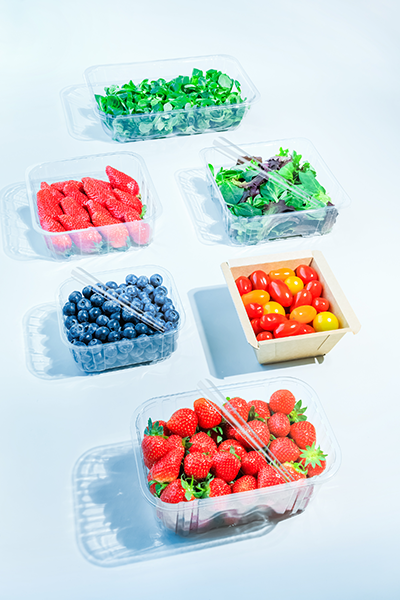Delivery bottlenecks and delays will probably continue to plague some companies in the fruit and vegetable sector until the middle of next year. However, the Guillin Group from France does not seem to be affected by this, says Gero Ziemer, who represents Guillin in Germany. "We haven't had any supply problems at all. On the contrary, our capacity was ensured by our various production sites. With Nespak in Italy, Veripack in Spain, Dynaplast in France and Sharpak in England, we were able to anticipate production and stock levels for the German market," Ziemer says.
Eve Feld-Renard and Gero Ziemer at expoSE in Karlsruhe 2021.
Packaging is less in demand, but still necessary
Ziemer notes that in supermarket chains, demand for packaging is steadily declining, "Supermarkets are generally trying to show their customers a packaging-free fruit and vegetable section. But you have to bear in mind - and I learned this by visiting various markets - that this means that a lot of fresh produce has to be thrown away prematurely if packaging per se is dispensed with. So if you really want to act sustainably, you can't get around packaging! On the contrary, packaging provides the best possible protection for many types of berries and fruits. I don't understand why supermarkets don't educate the end customer and include all processes in terms of sustainability. I think you have to look at each fruit and vegetable category separately and then decide which really represents the best packaging!"
Guillins plastic and cardboard packaging is still in high demand, especially for soft fruits, Ziemer says. "Especially if you want to prevent spoilage, you can't get around packaging." In terms of cost, he says the plastic tray is also cheaper compared to any cardboard tray. But importantly, both types of trays, plastic trays and cardboard trays, are made from sustainable resources.
Top Seal trending
"For raspberries and bluebe rries, people are trying to use Top Seal more often. It should be emphasized that, so far, this has been exclusively plastic packaging with Top Seal films. This is because previous projects using Top Seal for cardboard packaging show that there are still no well-functioning solutions, which is why the company continues to focus on plastic packaging with Top Seal.
rries, people are trying to use Top Seal more often. It should be emphasized that, so far, this has been exclusively plastic packaging with Top Seal films. This is because previous projects using Top Seal for cardboard packaging show that there are still no well-functioning solutions, which is why the company continues to focus on plastic packaging with Top Seal.
Pictured right: packaging from Guillin. ©GUILLIN
We want to offer our customers everything they need, although we know that you can see the product or the berries as a whole better in the PET tray, while carton packaging is opaque. The projects and the top-seal packaging now underway with plastic trays are good and well-rehearsed," Ziemer says.
Top Seal packaging of the F500N series from Guillin is in great demand, especially in the berry sector. Other popular packages include the BF12 and also the F-1912 series of Top Seal sealers. "The trend is clearly towards top sealing. Supermarkets are increasingly using Top Seal film to save more on plastic as well."
Guillin Group was at expoSE in Karlsruhe, Germany, in November 2021 and will be at the Fruit Logistica trade show in April 2022.
For more information:![]() Gero Ziemer
Gero Ziemer
Guillin Deutschland GmbH
Ostring 57
DE-66740 Saarlouis
Tel: +49 6831 48 77 565
Fax: +49 6831 48 77 882
E-mail: info@guillindeutschland.de
Website: http://www.guillindeutschland.de
